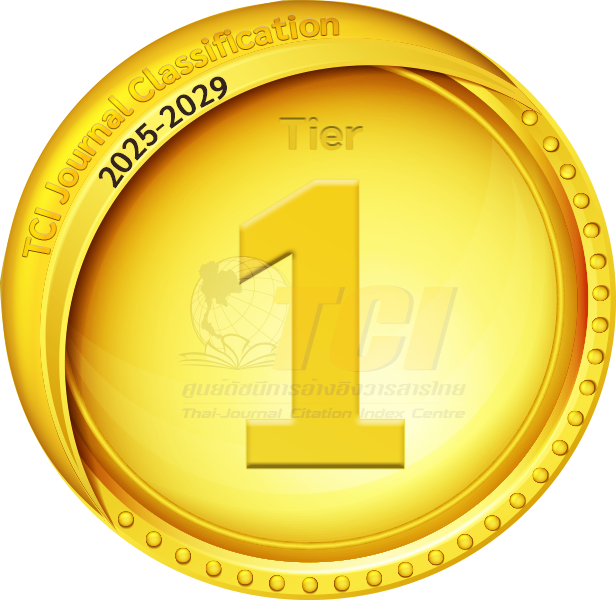Infected Aneurysms in Thai Patients: Computed Tomography Findings
Infected Aneurysms in Thai Patients: Computed Tomography Findings
DOI:
https://doi.org/10.46475/asean-jr.v18i1.999Keywords:
infected aneurysms, mycotic aneurysms, computed tomographyAbstract
Objectives: To determine the CT characteristics of infected aortic and visceral aneurysms and evaluate
the difference between Salmonella and non-Salmonella infections by radiography.
Materials and Methods: Records of patients with surgical and/or pathologicalimicrobiologic proof of of of
infected aortic aneurysm collected over a 5-year period were reviewed. Computed tomography (CT).
demographics and clinical data were studied. Twenty-eight aneurysms were found in 24 patients including
18 men and 6 women between the age of 35-78 years (mean = 63.29 years), The size, shape and location
of aneurysm, aortic wall calcification, gas, and periaortic findings were evaluated.
Results: Aneurysms were located in the thoracoabdominal aorta (n=1: 4.2%), juxtarenal aorta (n=7;
29.2%). infrarenal aorta (n=13: 54.296), superior mesenteric artery (n=1: 4.296), and llac arteries (n=2;
83%). One patient had 2 infected aortic aneurysms and one patient had 4 infected aortic aneurysms. All
28 aneurysms were saccular with a mean diameter of 42 + 2.4 cm (range, 0.6-10.4 cm). Paraaortic
stranding, and/or fluid retention was present in 28 aneurysms (100%), paraaortic soft tissue mass in 21
aneurysms (7576), enhancing irregular wal thickening in 19 aneurysms (67.996), disruption of calcition
in the aortic wall in 13 aneurysms (46.496), and perianeurysmal gas in 5 aneurysms (20.8%), Other fings
included ryptured/ concealed ruptured aneurysm (n=9, 32.196), adiacent vertebral body erosion/osteomy-
elitis (n=5. 20.8%), renal abscess (n=1. 4.8%) and psoas abscess (n=3, 14.3%).
Conclusion: Saccular aneurysms especially those with adjacent stranding/fluid, and mass were highly
suspicious of infection. Perianeurysmal gas and patients with relatively older age were found more common
in salmonella infection than those with non-salmonella infection. Whereas, mutiple aneurysms were more
common in non-salmonella infection.
Downloads
Metrics
References
Macedo TA, Stanson AW. Oderich GS, et al. Infected
aortic aneurysms: imaging findings. Radiology. 2004;
:250-7.
Misako I, Sachio K, Satoshi I, et al. Sensitivity and
Specificity of CT in the Diagnosis of Inflammatory
Abdornal aortic aneurysms. Journal of computer assisted
tomography. 2002:26(6):1006-12. DOI: https://doi.org/10.1097/00004728-200211000-00026
Ming PL, Shih CC. Reng HW. A comparison of computed
tomography, magnetic resonance imaging, and digital
subtraction angiography findings in the diagnosis of
infected aortic aneurysm. Journal of computer assisted
tomography. 2008:32:616-20. DOI: https://doi.org/10.1097/RCT.0b013e31814db154
Sirluck A. Ploenchan C. Churairat K. Mycotic aneurysm
in northeast Thailand: The importance of Burkholderia
pseudomallei as a causative pathogen. Clinical infectious
diseases. 2008;47:1436-9. DOI: https://doi.org/10.1086/592975
Wai-Kit L. Peter JM, Andrew FL, et al. Infected (Mycotic)
Aneurysms: Spectrum of imaging appearances and
management. Radiographics. 2008.28:1853-68. DOI: https://doi.org/10.1148/rg.287085054
Theerapong K. Boonmee S. Roongnapa Pa P, et alinical
and epidemiological analyses of human Pythiosis in
Thailand. Clinical infectious dises 2006:43:569-76.
Azlina AB, CS Ngju, Mohamad S. Petrick P. Salmonalla
related mycotic aneurysm with psoas and paraortic
abscess treated conservatively. Annals academy of
medicine 2011:40:467-68 DOI: https://doi.org/10.1016/S0889-8553(11)00047-1
Bennett DE. Primary mycotic aneurysms of the aorta:
report of case and review of the literature. Arch Surg.
;94:758-65.
Oderich GS, Parneton JM. Bower TC, et al. Infected
aortic aneurysms: aggressive presentation, complicated
early outcome, but durable results. J Vasc Surg, 2001:34:
-8.
Castaneda-Zuniga WR. Nath PH, Zollikofer C, et al.
Mycotic aneurysm of the aorta. Cardiovasc Intenvent
Radiol. 1980:3:144-9. DOI: https://doi.org/10.1007/BF02551976
Coselli JS, LeMaire SA. Diseases of the thoracic aorta.
In. Dean RH, Yao JST. Brewster DC, eds. Current diagnosis
and treatment in vascular surgery. Norwalk, Conn: Appleton
& Lange, 1995;118-32.
Downloads
Published
How to Cite
Issue
Section
License
Copyright (c) 2012 The ASEAN Journal of Radiology

This work is licensed under a Creative Commons Attribution-NonCommercial-NoDerivatives 4.0 International License.
Disclosure Forms and Copyright Agreements
All authors listed on the manuscript must complete both the electronic copyright agreement. (in the case of acceptance)

















